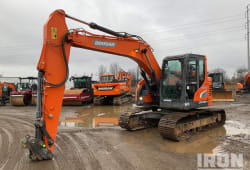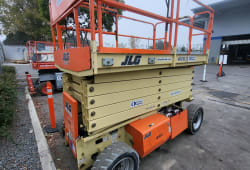Delving Into the Benefits of Construction Labor Unions & Collective Bargaining
13 Min read
)
August 10, 2023
Construction labor unions and collective bargaining play a crucial role in protecting the rights and improving the conditions of workers in the construction industry. By advocating for workers' rights, ensuring safe working conditions, and providing training and education opportunities, labor unions provide numerous benefits to construction workers. Additionally, joining a construction labor union offers job security, better wages and benefits, and collective bargaining power. In this article, we will explore the benefits of construction labor unions and collective bargaining in more detail, examine case studies of successful union negotiations, address criticisms and challenges of labor unions, and discuss the future of construction labor unions in an ever-evolving industry.
Understanding Labor Unions
Definition and Purpose of Labor Unions
A labor union is an organization that represents and advocates for the rights and interests of workers in a particular industry. The main purpose of labor unions is to negotiate with employers on behalf of their members to secure better working conditions, wages, and benefits.
Labor unions have a long and rich history, dating back to the early days of the Industrial Revolution. Workers faced harsh and unsafe conditions, with long hours and little compensation. In response, workers began to organize themselves into unions, recognizing the power of collective bargaining to bring about change.
These unions became a voice for workers, fighting for fair treatment, improved wages, and safer working conditions. They played a pivotal role in shaping the modern labor landscape, advocating for workers' rights and challenging the status quo.
History of Labor Unions in the Construction Industry
:format(webp))
The history of labor unions in the construction industry is intertwined with the broader labor movement. As construction boomed during the Industrial Revolution, workers in this sector faced unique challenges. They were often subjected to grueling labor, dangerous conditions, and inadequate compensation.
In response to these hardships, construction workers began to organize themselves into unions. These unions fought for better working conditions, pushing for shorter work hours, improved safety regulations, and fair wages. They recognized that by joining forces, they could amplify their voices and demand change from employers.
Over the years, labor unions in the construction industry have achieved significant victories. They have negotiated collective bargaining agreements that guarantee fair wages, benefits, and protections for workers. These agreements have helped create a more equitable and stable work environment for construction workers.
Furthermore, labor unions have played a crucial role in training and apprenticeship programs within the construction industry. By investing in education and skill development, unions have ensured that workers have the necessary training to perform their jobs safely and efficiently. These programs have not only benefited workers but have also contributed to the overall quality and professionalism of the construction industry.
Today, labor unions continue to be a driving force in the construction industry. They advocate for fair treatment, fight against exploitative labor practices, and strive to create a level playing field for all workers. Through their collective efforts, they have helped shape the construction industry into what it is today.
The Role of Construction Labor Unions
Construction labor unions play a vital role in the construction industry, advocating for workers' rights, ensuring safe working conditions, and providing training and education opportunities. By representing their members during negotiations with employers, unions ensure that workers' voices are heard and their concerns are addressed.
Advocacy for Workers' Rights
One of the primary roles of construction labor unions is to advocate for the rights and interests of workers. Unions understand the importance of fair wages, reasonable working hours, and job security. Through collective bargaining, unions negotiate with employers to establish fair and equitable employment terms. This advocacy helps protect workers from exploitative practices and creates a fairer and more equitable working environment.
Moreover, unions also play a crucial role in ensuring that workers have access to important benefits such as healthcare, retirement plans, and paid leave. By fighting for comprehensive benefits packages, unions help improve the overall well-being of construction workers and their families.
Ensuring Safe Working Conditions
Construction can be a hazardous industry, with workers exposed to various risks such as falls, electrical hazards, and exposure to harmful substances. Labor unions work diligently to ensure that safety regulations are implemented and followed on construction sites. They collaborate with employers to establish and enforce safety protocols, conduct regular inspections, and provide necessary safety equipment and training.
By advocating for adequate safety measures, unions help protect workers from accidents, injuries, and even fatalities. They strive to create a culture of safety in the construction industry, where workers can perform their jobs in a safe and secure environment. This not only benefits the workers themselves but also enhances the overall productivity and efficiency of construction projects.
Training and Education Opportunities
:format(webp))
Construction labor unions recognize the importance of continuous learning and skill development in the ever-evolving construction industry. They play a significant role in providing training and education opportunities to their members.
Through apprenticeship programs, unions offer aspiring construction workers the chance to learn from experienced professionals. These programs combine on-the-job training with classroom instruction, allowing apprentices to gain practical skills while also deepening their knowledge of their chosen trade.
Furthermore, unions organize ongoing training initiatives to ensure that their members stay updated with the latest industry practices and technologies. They offer workshops, seminars, and certification programs that cover a wide range of topics, including safety procedures, new construction techniques, and emerging trends in the industry.
By investing in the training and education of their members, construction labor unions not only enhance the individual skills and capabilities of workers but also contribute to the overall quality of work in the construction industry. Skilled and knowledgeable workers are essential for delivering high-quality and sustainable construction projects.
In conclusion, construction labor unions play a crucial role in advocating for workers' rights, ensuring safe working conditions, and providing training and education opportunities. Their collective efforts contribute to a more equitable and prosperous construction industry, benefiting both workers and employers alike.
Benefits of Joining a Construction Labor Union
Joining a construction labor union provides workers with numerous benefits that contribute to their overall job satisfaction and well-being. In addition to the obvious advantages mentioned, such as job security, better wages, and collective bargaining power, several other significant perks come with being a union member.
Enhanced Training and Skill Development
Construction labor unions are committed to the professional growth and development of their members. They offer a wide range of training programs and workshops designed to enhance workers' skills and keep them updated with the latest industry trends. These programs cover various areas, including safety protocols, technological advancements, and specialized construction techniques. By investing in the continuous improvement of their members, unions ensure that workers are equipped with the necessary knowledge and expertise to excel in their respective roles.
Health and Safety Standards
Unions prioritize the well-being of their members by advocating for and enforcing strict health and safety standards on construction sites. They work closely with employers to ensure that proper safety protocols are in place, reducing the risk of accidents and injuries. Union members benefit from comprehensive training on workplace safety, personal protective equipment, and emergency response procedures. By prioritizing the health and safety of their members, unions create a work environment that promotes physical well-being and peace of mind.
Job Mobility and Transferability
Another advantage of joining a construction labor union is the increased job mobility and transferability it offers. Union members often have access to a wide network of job opportunities within the industry. This means that if a construction project ends or if a worker wishes to explore new avenues, they can easily transfer to another project or company without losing the benefits and protections provided by their union. This flexibility allows workers to adapt to changing circumstances while maintaining their job security and stability.
Advocacy and Representation
Construction labor unions serve as the voice of their members, advocating for their rights and interests at various levels. They actively engage in legislative processes, lobbying for policies that benefit workers in the construction industry. Unions also provide legal representation and support to members facing workplace disputes or unfair treatment. This ensures that workers have a strong support system and are not left to navigate challenging situations alone.
Community and Camaraderie
Joining a construction labor union provides workers with a sense of community and camaraderie. Union members often participate in social events, networking opportunities, and charitable initiatives that foster a strong bond among workers. This sense of belonging and solidarity creates a positive work environment, where members support and uplift one another, both professionally and personally.
In conclusion, joining a construction labor union offers a multitude of benefits beyond job security, better wages, and collective bargaining power. From enhanced training and skill development to improved health and safety standards, unions play a vital role in ensuring the overall well-being and success of their members. By joining a union, workers gain access to a supportive community that advocates for their rights and provides opportunities for personal and professional growth.
The Process of Collective Bargaining
Understanding Collective Bargaining
Collective bargaining is a complex and intricate process that involves representatives from labor unions and employers coming together to negotiate the terms and conditions of employment. It goes beyond simple discussions and compromises, as it requires both parties to engage in meaningful dialogue and reach mutually agreed-upon decisions that benefit not only the workers but also the employers.
During the collective bargaining process, various important factors come into play. These include analyzing market trends, assessing the financial capabilities of the employers, and understanding the needs and demands of the workers. Both sides must be willing to listen to each other's perspectives and find common ground to ensure a successful outcome.
The Role of Unions in Collective Bargaining
Unions play a pivotal role in the collective bargaining process, acting as the voice of the workers and advocating for their rights and interests. They bring together a diverse range of workers, representing their concerns and demands to the employers. Through their expertise and knowledge, unions fight for fair wages, improved working conditions, and comprehensive benefits packages.
Effective collective bargaining requires unions to conduct thorough research and analysis to support their proposals. They must study industry standards, economic indicators, and labor laws to build a strong case for their members. Unions also provide essential support and guidance to workers throughout the negotiation process, ensuring that their voices are heard and their rights are protected.
Benefits of Collective Bargaining for Construction Workers
Collective bargaining holds significant benefits for construction workers, who often face unique challenges and risks in their line of work. By engaging in collective bargaining, these workers gain a collective voice and the opportunity to shape their working conditions.
One of the key advantages of collective bargaining for construction workers is the ability to have a say in decision-making processes. Through their unions, they can actively participate in discussions regarding safety protocols, work schedules, and project assignments. This involvement allows workers to contribute their expertise and experiences, leading to safer and more efficient construction practices.
Additionally, collective bargaining ensures fair treatment for construction workers. By negotiating with employers, unions seek to establish clear guidelines for wages, overtime pay, and benefits. This helps protect workers from exploitation and ensures they receive compensation that reflects the demanding nature of their work.
Furthermore, collective bargaining provides construction workers with a sense of security and stability. By securing better wages and improved working conditions, workers can focus on their jobs without the constant worry of financial instability. Access to comprehensive benefits such as healthcare coverage and retirement plans also contributes to their overall well-being.
Collective bargaining is a dynamic process that continues to evolve with the changing needs and demands of the workforce. It is a powerful tool that empowers workers and allows them to actively participate in shaping their working lives. Through effective negotiation and collaboration, collective bargaining has the potential to create a harmonious and productive working environment for both employers and workers alike.
Case Studies of Successful Union Negotiations
:format(webp))
Improved Working Conditions through Union Advocacy
One notable case study of successful union negotiations is the improvement of working conditions for construction workers. Through collective bargaining, labor unions have successfully pushed for safer work environments, proper safety equipment, and improved health and safety regulations on construction sites. These efforts have significantly reduced accidents and injuries, enhancing the overall well-being of workers.
Wage Increases Achieved Through Collective Bargaining
Another successful case study involves wage increases achieved through collective bargaining. Labor unions have been successful in negotiating higher wages for construction workers, ensuring that their contributions are adequately rewarded. This has not only improved the financial stability of workers but has also attracted more skilled individuals to the construction industry.
Criticisms and Challenges of Labor Unions
Potential Downsides of Union Membership
While labor unions offer numerous benefits to construction workers, there are some potential downsides to consider. Some argue that union membership may limit individual flexibility, as workers must adhere to collective agreements negotiated on their behalf. Additionally, union membership may require payment of dues, which could be perceived as a financial burden for some workers.
Addressing Common Misconceptions about Labor Unions
There are also common misconceptions about labor unions that need to be addressed. One misconception is that unions hinder productivity and efficiency. However, numerous studies have shown that labor unions can improve workplace productivity by ensuring fair treatment and providing worker representation.
The Future of Construction Labor Unions
The Impact of Technology on Construction Labor Unions
As technology continues to advance, it will undoubtedly impact the construction industry and labor unions. While technological advancements may lead to job displacement in some areas, labor unions can play a vital role in reskilling and retraining workers to adapt to these changes. By partnering with employers and investing in training programs, unions can ensure that workers are equipped with the necessary skills to thrive in a changing work landscape.
Labor Unions and the Gig Economy
The rise of the gig economy presents both challenges and opportunities for construction labor unions. As more workers engage in short-term or freelance work, unions have the opportunity to adapt their structures and negotiating strategies to represent these workers effectively. By advocating for fair working conditions and protections for gig workers, labor unions can play a significant role in improving the well-being of all construction workers.
The Role of Unions in Promoting Diversity and Inclusion in the Construction Industry
Promoting diversity and inclusion is an important issue in the construction industry. Labor unions can play a significant role in advocating for equal opportunity and fair treatment for individuals from all backgrounds. By working to eliminate discrimination and offering support and resources for underrepresented groups, unions contribute to a more diverse and inclusive construction industry.
In conclusion, construction labor unions and collective bargaining provide numerous benefits to workers in the construction industry. From advocacy for workers' rights and ensuring safe working conditions to providing training and education opportunities, unions play a crucial role in empowering construction workers. Joining a labor union offers job security, better wages, and collective bargaining power. Despite criticisms and challenges, labor unions continue to evolve and adapt to the changing landscape of the construction industry. By addressing misconceptions, promoting diversity and inclusion, and embracing technological advancements, labor unions are vital in shaping a fair and equitable future for construction workers.














